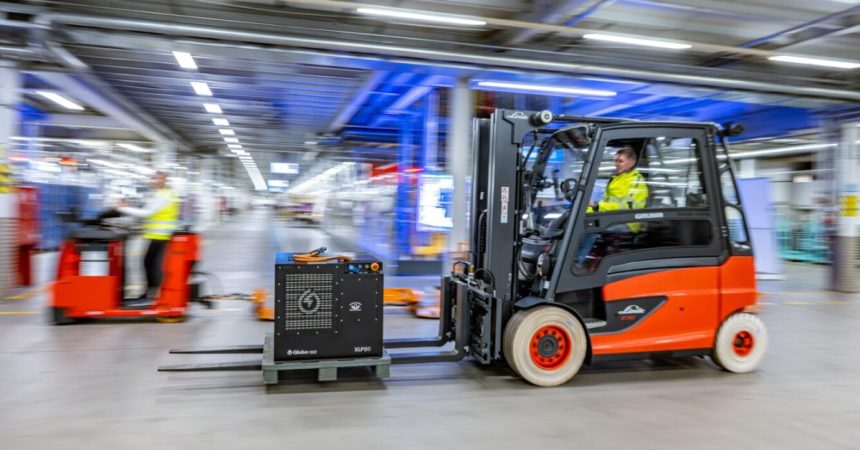Bavarian automaker BMW has introduced plans to transform the intralogistics fleet at its Regensburg plant from battery to hydrogen energy, with FCEV forklift and tugger vehicles set to interchange the whole thing of its present fleet by 2030.
Regardless of gross sales of BMW’s battery electrical beginning to take off, the propeller firm remains to be investing closely in gasoline cell improvement – from its newest iX5 Hydrogen FCEV idea to, effectively, the intralogistics fleet at its Regensburg plant, the place the corporate plans to make use of hydrogen forklifts and tuggers within the press store, physique store, and meeting traces.
BMW’s aggressive deployment timeline is, after all, loaded with issues. For starters, little or no hydrogen is definitely “inexperienced,” and nearly all of conventionally obtainable hydrogen is created utilizing fossil fuels – making it each far much less environmentally sustainable than you would possibly suppose … and much more costly than both diesel gasoline or battery capability.
Then there’s the outright misinformation, like this tidbit:
Switching manufacturing logistics from electrical energy to hydrogen will diversify our plant’s power combine – whereas optimizing logistics processes and saving useful area. The benefit of hydrogen is that refueling could be very quick – similar to with standard fuels. The filling stations required for this can be put in instantly throughout the completely different manufacturing areas and don’t take up a lot area.
Venture Supervisor, BMW Regensburg, Katharina Radtke
I don’t suppose this can be a state of affairs the place Katharina is attempting to unfold misinformation – however she does, like many hydrogen followers, appear to be misinformed.
See, if you replenish a storage tank with a gasoline like H or CNG, the gasoline heats up because it’s shortly compelled into the tank, inflicting it to develop. Meaning the identical quantity of gasoline takes up extra bodily area scorching than it does chilly – and, because the gasoline within the tank steadily cools down, it contracts, leaving empty area within the tank.
Meaning you possibly can “quick fill” a hydrogen tank to 100% in a couple of minutes, nevertheless it’ll ultimately settle again right down to about 75-80% full, even should you don’t drive anyplace. You’ll then must “sluggish fill” the remaining capability to keep away from an analogous growth – and that can take hours.
You’ll be able to see an instance of this phenomenon, under, on this interactive infographic from the US Division of Power’s Different Fuels Information Middle (AFDC).
Electrek’s Take

In case you possibly can’t learn between the traces, filling a tank with hydrogen isn’t any sooner than filling a battery with electrical energy, and even probably the most cryo-compressed hydrogen tanks can’t get too far previous a 90% quick fill … they usually produce other issues with boil off, leaks, and many others. All of which kind of begs the query: why make the swap to hydrogen in any respect?
Again in January, MAN Vehicles’ CEO, Alexander Vlaskamp, advised reporters that it was, “unattainable for hydrogen to successfully compete with battery electrical vehicles.” Vlaskamp added, “Immediately you can’t purchase hydrogen for lower than 13 or 14 euros … and it’s not inexperienced. And when we now have inexperienced hydrogen it is going to be wanted for the heavy trade of metal, cement, or plastic.”
So — if all that’s true, why is MAN, like BMW, persevering with to put money into hydrogen-powered car packages? “Solely to check our speculation,” says Vlaskamp (emphasis mine). “We might use hydrogen for transportation in 2035, however provided that there’s sufficient inexperienced hydrogen on the proper value and the required infrastructure is in place.”
To make sure it has sufficient H, BMW will set up a mile-long community of underground pipes, with six decentralized H filling stations, between now and Q1 of 2026. “As soon as the conversion is accomplished, our annual hydrogen consumption can be round 150 tonnes,” says Radtke.
Right here’s hoping BMW can get a greater deal than 14 euros for soiled gasoline by then.
SOURCE | IMAGES: BMW.






